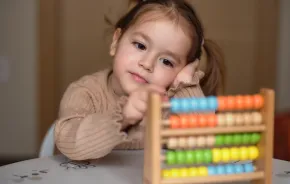
As the clock slowly ticks down to the final ring of the school bell, kids everywhere dream of those long days of summer filled with endless playtime and carefree fun. However, while this break from the classroom gives kids the chance to relax and revive before the next school year, it can also have another, unintended effect, called “summer slide.”
According to the National Summer Learning Association, students that are not engaged in learning over the summer can “slide” backward two to three months in their academic skills. The overall effect is a large number of children heading back to school unprepared for the next grade.
The good news: You can make a real difference in preventing summer slide. Here are a few simple summer activities that feel like playtime … and help kids’ skills stay sharp all summer long!
1. Make summer a real page-turner!
 Summer reading builds a richer vocabulary and keeps brains engaged. Make it a habit to visit the library and help your child find “just right” books that are of high interest and written at an appropriate reading level. To do this, use the five-finger test: Ask your child to read a page with several words as you hold up a finger for each unknown word. If you reach five fingers, the book may be at a higher level than your child is ready for, which may cause frustration and prevent independent reading. However, if this book is still one your child is set on, check it out and read it together.
Summer reading builds a richer vocabulary and keeps brains engaged. Make it a habit to visit the library and help your child find “just right” books that are of high interest and written at an appropriate reading level. To do this, use the five-finger test: Ask your child to read a page with several words as you hold up a finger for each unknown word. If you reach five fingers, the book may be at a higher level than your child is ready for, which may cause frustration and prevent independent reading. However, if this book is still one your child is set on, check it out and read it together.
You can also encourage reading by making it fun and interactive. Set up an outdoor tent or indoor fort that’s designated as “The Reading Tent.” Then set aside time to talk with your child about what they are reading. Ask questions such as, “What was your favorite part?” and, “Who are the characters and what are they like?” When reading nonfiction, ask, “Are there any new facts you learned?” You might even start a family book club!
2. Make the most of screen time
It’s no secret that our kids today are digital natives: tablets, computers and smartphones easily engage them. Take advantage of treasured screen time and look for interactive books and apps that are not only fun, but also help strengthen reading and math skills. This way, your child can learn while riding in the car to grandma’s house or on your way to your summer vacation spot!
3. Have fun with word play … outside!
Sidewalk chalk and water painting are two classic summer activities that can be turned into exciting outdoor learning experiences — particularly for early readers. Write words such as star, sun and ball on the sidewalk. Have your child draw or paint the picture of the word underneath. You can also ask your child to paint or write rhyming words like hat, cat and rat. Then ask, “What do you notice about how the words are spelled?” This helps early readers build important decoding and phonics skills.
4. Boost math skills with card games
Cards are a great way to keep your child’s math facts fresh while simultaneously developing number sense and computation skills. Use a standard deck of cards to play War, a perfect game for helping young children recognize and compare numbers that are greater than or less than. When playing with older children, each player can take two cards, add them together (or subtract or multiply) and compare the results. The player with the highest number wins!
 5. Cook up some fun
5. Cook up some fun
Plan a meal or a favorite family dessert to bake, then have your child read the recipe and make a grocery list. While cooking or baking together, ask your child to be responsible for measuring the ingredients. This is a great way for children to explore fractions, practice measurement, boost reading and writing skills … not to mention learn to follow written instructions.
6. Give family game night an educational twist
Game nights offer the perfect opportunity to spend time together as a family, while also providing an exciting way to keep kids’ minds sharp over the summer. Choose games that encourage the reading of question cards, following directions or even counting money and solving math problems. When the whole family is involved, learning and bonding take place at the same time!
7. Use summer experiences as a springboard for learning
Did your child visit a museum, science center or amusement park this summer? Did you take a family vacation? Build upon these experiences by asking your child, “Which activity did you enjoy the most?” If your child enjoyed the roller coasters, do some online research or find books about the top roller coasters in the U.S. and share these with your child. Going on vacation? Invite your child to review travel guides, maps and brochures about the city you’re visiting. Then ask your child to help plan a list of things to do. These activities provide reading practice, teach map-reading skills, build new vocabulary … and so much more!









